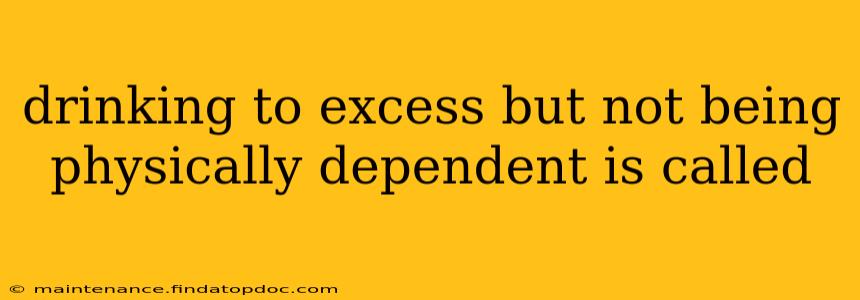Many people associate excessive alcohol consumption solely with physical dependence (alcoholism). However, drinking to excess without meeting the criteria for a substance use disorder is a significant issue with serious health consequences. This condition, often referred to as harmful alcohol use or alcohol abuse, doesn't involve the physiological withdrawal symptoms characteristic of dependence, but it still carries substantial risks. Let's delve deeper into understanding this complex issue.
What is Harmful Alcohol Use?
Harmful alcohol use refers to a pattern of drinking that causes significant harm to the individual's physical or mental health, or their social relationships, without fulfilling the diagnostic criteria for alcohol dependence (as defined by the DSM-5 or ICD-11). This means the individual may not experience physical withdrawal symptoms if they stop drinking, but their alcohol consumption is still causing demonstrable negative consequences.
This distinction is crucial. While alcohol dependence involves a complex interplay of physical and psychological factors, leading to a compulsive need for alcohol, harmful alcohol use emphasizes the harm caused by excessive drinking, irrespective of dependence.
What are the signs of harmful alcohol use?
Identifying harmful alcohol use can be challenging because it lacks the clear-cut indicators of dependence. However, several warning signs should raise concern:
- Consistent heavy drinking: Regularly consuming amounts exceeding recommended guidelines. This varies depending on factors like sex, age, and overall health but typically involves exceeding the recommended daily or weekly limits set by health organizations.
- Negative consequences: Experiencing recurring problems as a result of drinking. These problems might include relationship difficulties, job loss, legal troubles, financial issues, physical health problems (like liver damage or pancreatitis), or risky behaviors (like drunk driving).
- Failed attempts to cut back: Recognizing a problem with drinking but struggling to reduce or stop consumption despite attempts to do so.
- Neglecting responsibilities: Prioritizing drinking over responsibilities at work, home, or school.
- Continued drinking despite negative consequences: Ignoring the clear negative impacts alcohol is having on their life.
Is harmful alcohol use as serious as alcohol dependence?
While not as severe as alcohol dependence in terms of physical withdrawal symptoms, harmful alcohol use is still extremely serious. The negative consequences can be equally damaging, leading to significant health problems, social isolation, and even premature death. The long-term effects on organs like the liver, heart, and brain can be substantial, even in the absence of physical dependence.
How is harmful alcohol use treated?
Treatment for harmful alcohol use often focuses on:
- Behavioral therapy: Techniques like cognitive behavioral therapy (CBT) can help individuals identify and change harmful drinking patterns and coping mechanisms.
- Motivation enhancement therapy (MET): This approach helps individuals recognize the negative consequences of their drinking and develop motivation to change.
- Support groups: Alcoholics Anonymous (AA) and other support groups offer peer support and a sense of community. While AA's 12-step program is geared towards dependence, the social support can benefit individuals struggling with harmful alcohol use.
- Lifestyle changes: Addressing underlying issues like stress, anxiety, or depression can be crucial in managing alcohol consumption.
What's the difference between harmful use and alcohol dependence?
This is a key distinction. Alcohol dependence involves physical dependence, tolerance (needing more alcohol to achieve the same effect), withdrawal symptoms upon cessation, and often, a loss of control over drinking. Harmful alcohol use, on the other hand, focuses on the harm caused by drinking without the presence of these physical dependence markers. Both conditions require intervention and support.
Can harmful alcohol use lead to alcohol dependence?
Yes, harmful alcohol use can be a precursor to alcohol dependence. Continued heavy drinking without addressing the underlying issues can easily progress to a more severe condition where physical dependence develops. Early intervention is vital to prevent this progression.
In conclusion, while not synonymous with alcoholism, harmful alcohol use presents significant risks to health and well-being. Recognizing the signs and seeking appropriate help are crucial steps towards a healthier and safer life. If you or someone you know is struggling with excessive drinking, it's essential to seek professional guidance.
